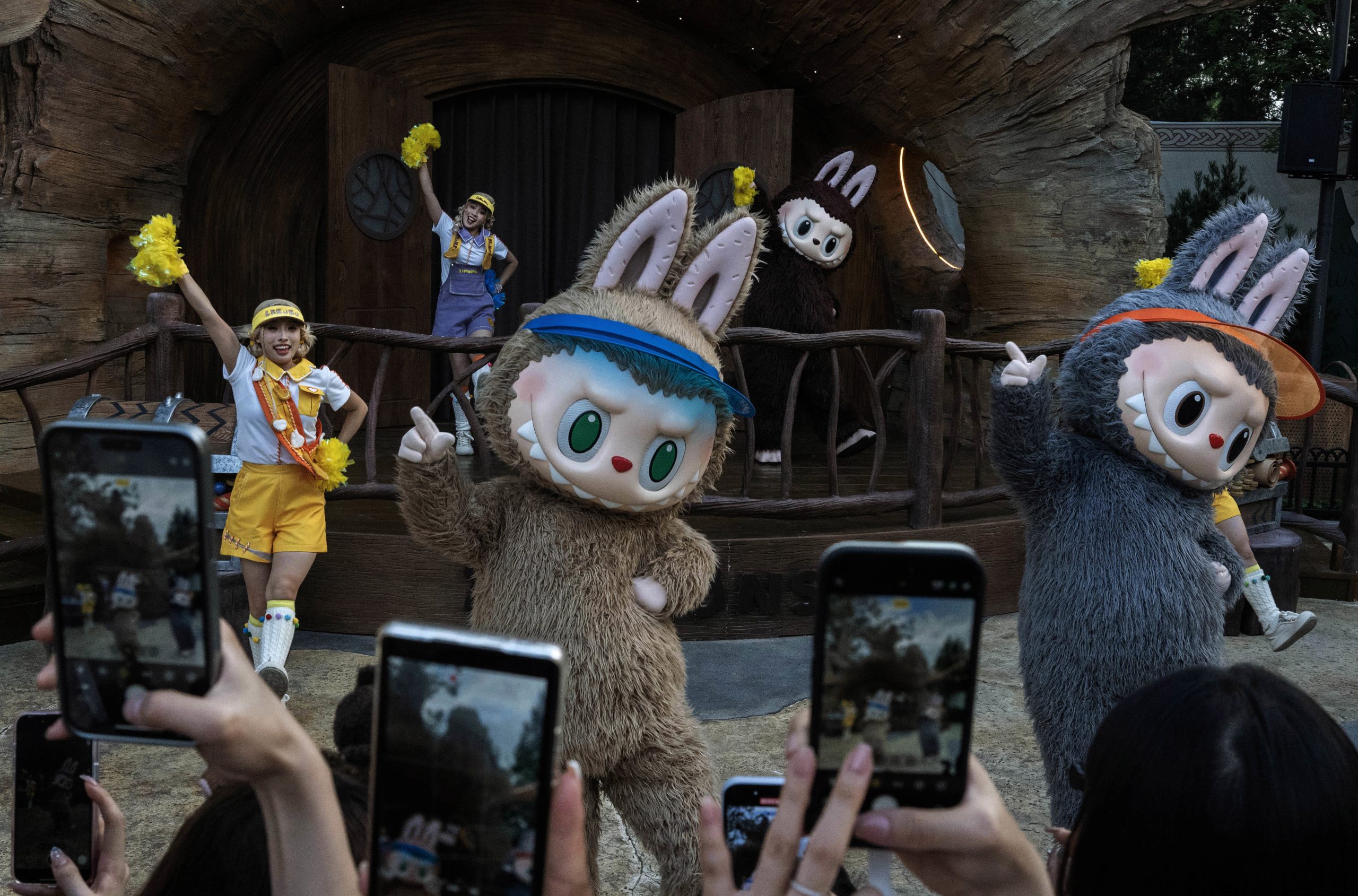Like many Labubu fans, 28-year-old American Joselyn Chamorro is over the craze.
Waiting in overnight lines to buy the $US30 ($46) mischievous dolls, or shelling out $US100 to resellers, has lost its appeal. So when she saw a service station in Florida, was selling fake Labubus — known as Lafufus — for $US20, she didn’t hesitate to buy one.
Trying to get a real Labubu, “it’s almost like The Hunger Games,” Chamorro said.
READ MORE: Dad’s tiny selfless act ends in tragedy

Just like an authentic Labubu, it even came in a blind box, meaning the buyer doesn’t know the specific doll they’re getting.
Labubu’s maker, Pop Mart, seems unstoppable. The Beijing-based toy company expects its revenue this year to exceed 30 billion yuan, or $US4.2 billion.
Just in the Americas, revenue soared by more than 1000 per cent year-on-year, according to Pop Mart’s semi-annual report released in August. Globally, revenue for Labubus alone skyrocketed 668 per cent in the first half of the year.
But as rapidly as Labubus have risen in popularity, they could fall just as fast.
Shortages of the creepy-cute dolls, on top of the $US20 to $US40 price tag, have driven shoppers to look for alternatives.
Pop Mart’s strength lies in its creations that draw a cult following – Labubus, Cry Babies and Molly figurines – but the company still needs to grow past virality, Morningstar analyst Jeff Zhang said.
READ MORE: Vietnam plans mass evacuation as Typhoon Kajiki intensifies

“Compared with global leaders such as Disney and Sanrio, Pop Mart has yet to demonstrate a sufficiently long track record of generating excess return on invested capital from self-owned IPs,” Zhang wrote.
And in a twist, Lafufu owners aren’t afraid to share they have a knock-off.
Chamorro’s fake is smaller than the real Labubus, and its hands and face may be two different shades. But the palm-sized toy bears holds the same mischievous grin and soft fur that made the original go mind-bogglingly viral.
“My little monster, even though he’s not authentic, he’s still really cute in his own little way,” Chamorro said.
Pop Mart isn’t playing around
Pop Mart has trademarked “Labubu” since 2019 in the US and at least 2016 internationally, according to the company’s legal filings. And China is cracking down on Lafufus, with its customs agents seizing droves of fakes.
There’s a certain irony in China’s possessiveness over its Labubu IP. The country is known for pushing out fakes of practically every well-known brand, accounting for 45 per cent of all reported seizures of counterfeit goods in 2021, according to the Organisation for Economic Co-operation and Development.
READ MORE: Gaza’s biggest city in chaos ahead of imminent Israeli assault

It also doesn’t rank too highly in the US Chamber IP index, which measures the strength of intellectual property among different nations.
Pop Mart Americas recently sued a group of 7-Eleven stores in California for selling counterfeit Labubus. Zhang said more companies may face lawsuits from Pop Mart over Lafufus, but counterfeits might also decrease as Pop Mart ramps up its production.
A consumer standards body in the UK warned fake Labubu dolls could pose a choking hazard for young children. The US Consumer Product Safety Commission, which issued a similar warning, noted a real Labubu will feature a holographic Pop Mart sticker, a scannable QR code linking to the official Pop Mart site and exactly nine teeth; newer Labubus will also have “a subtle UV stamp on one foot.”
What’s driving demand for Labubus?
These days, you may see more Lafufus on the streets than Labubus, especially as social media has destigmatised the shame of owning knock-off toys.
Lafufus are “a lot more unique looking, you know, the little mess ups and the little quirks … people like that,” Cassandra Harrison, a 32-year-old from New Jersey, told CNN.
Many of her friends are starting Lafufu collections, and she recently found a wall of Lafufus at a phone repair store inside her local Super Walmart. But at the end of the day, Harrison still ended up purchasing a real Labubu.
Turning Labubu, originally a storybook character, into a beloved plush wasn’t exactly dumb luck, said Mark Tanner, managing director of consumer insights newsletter China Skinny. More and more Chinese companies are outpacing their Western competitors with rapid-fire product development, he told CNN.
Pop Mart did a lot of work behind the scenes to make the “blind box” approach work. Like most consumer trends today, the blind boxes appeal to shoppers who are scrolling through hyper-specific TikTok algorithms.
“(Pop Mart’s strategy) just aligns really well with the way people are consuming information right now, where the algorithm does all the work for them. When you buy a Labubu, you’re not having to make any choices,” Tanner said.
Pop Mart also doesn’t have the decades-long history as some of its Western competitors. So the company isn’t as concerned about retaining loyal customers — it’s still busy building its base.
Pop Mart has opened at least 50 stores this year around the world, Morningstar said. Morningstar analysts estimate that business outside China will account for 70 per cent of Pop Mart’s revenue in 2034, compared with 39 per cent in 2024.
DOWNLOAD THE 9NEWS APP: Stay across all the latest in breaking news, sport, politics and the weather via our news app and get notifications sent straight to your smartphone. Available on the Apple App Store and Google Play.